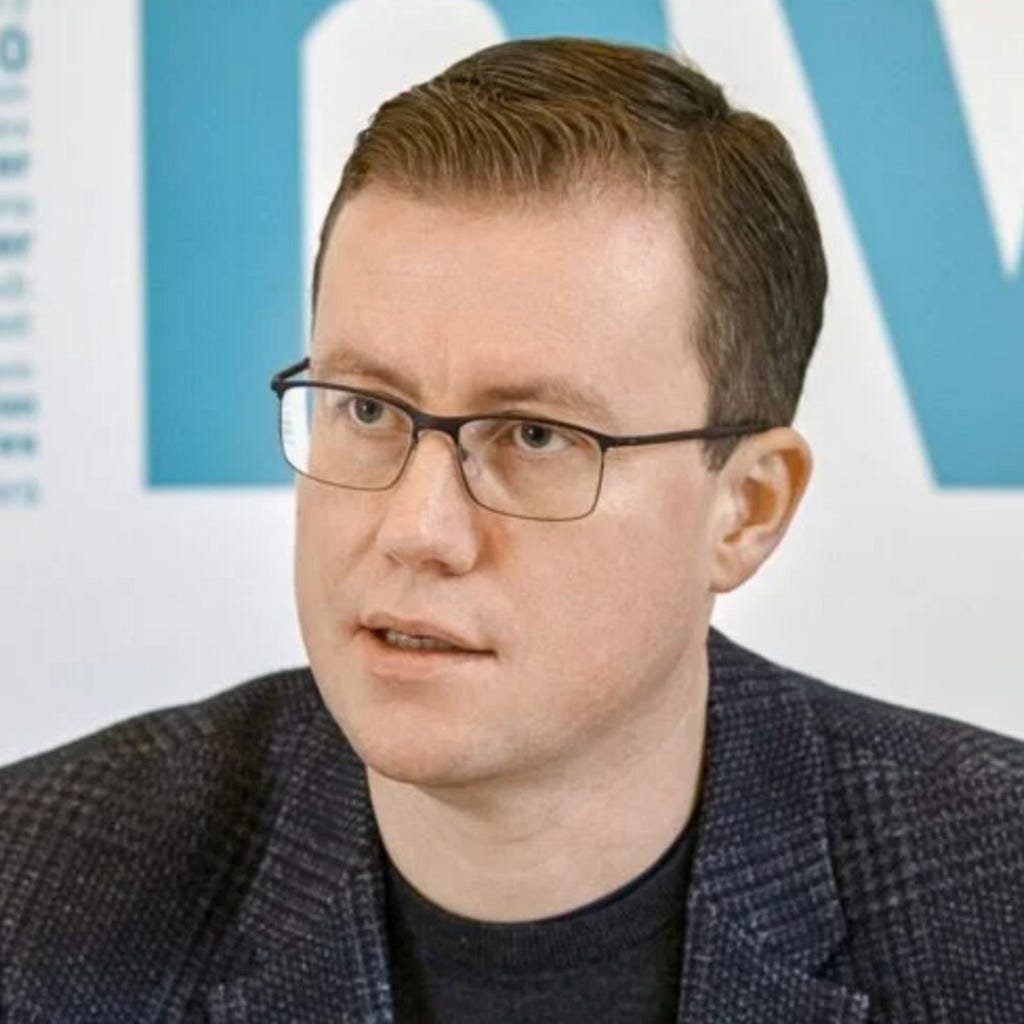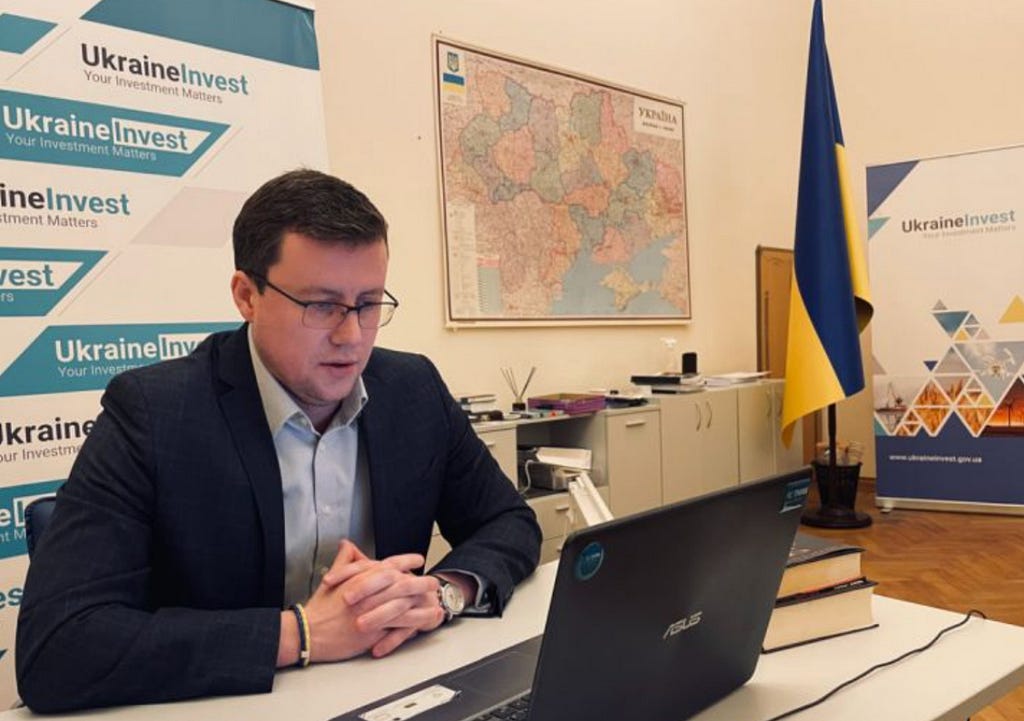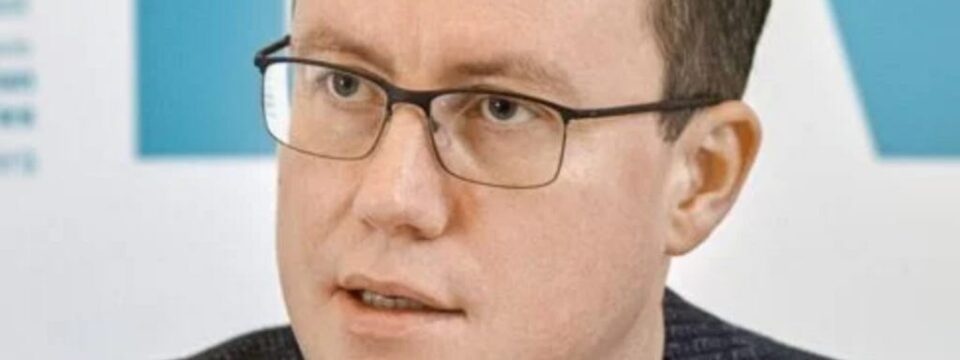Sergiy Tsivkach of Ukraine Invest On Five Things You Need To Be A Highly Effective Leader During Uncertain & Turbulent Times

Keeping people motivated. Not giving up yourself. If your team or partners or clients see you distressed and not motivated, then it will affect the whole situation around you. You motivate people not only with words, but also by the example of your daily actions. If you will focus on real tangible results, your team can better understand that they are in the right place and follow your example. So motivating the team by words and actions as well as focusing on the result is key.
As part of our series about the “Five Things You Need To Be A Highly Effective Leader During Turbulent Times”, we had the pleasure of interviewing Sergiy Tsivkach, CEO of UkraineInvest
Sergiy is the Advisor to the Deputy Prime Minister of Ukraine. He has a diploma from the King’s College of London on EU Competition Law as well as two Master’s degrees, one on International Commercial Law and another on EU Law. Sergiy also has extensive experience in financial analysis, business analysis and Mergers & Acquisitions. Previously, he was a Chairperson to C.A.S.E.S International and a Director on the EuroBusiness Advisory, making him the perfect person to detail on this topic given Ukraine’s current political and economical standing.
Thank you so much for your time! I know that you are a very busy person. Our readers would love to “get to know you” a bit better. Can you tell us a bit about your ‘backstory’ and how you got started?
I was born and raised here in Ukraine. Then, after I completed my bachelor’s and postgraduate degrees, I moved to London to pursue international commercial law where I lived for about 18 years. I was always working in between the West and Ukraine as well as some of the countries from the ex-Soviet Union helping to do business. I was always interested in business and investments and when I did my law degree, I picked a specific area that was actually called competition law. This is not so much about law as it’s about the economic processes that are wrapped up in legal procedures. You need to assess markets and see who is effective, who is helping, or who is making things more difficult. And then I switched from working as a business consultant which was mainly in the public sector to cooperation with international organizations like the United Nations, World Bank, and IFC.
In 2016, I moved back to Ukraine because I was doing a contract with the U.S. FTC to promote competition law and policy in Ukraine. I later joined the government as an adviser to the Prime Minister of Ukraine and was appointed head of UkraineInvest in 2020 where I became responsible for attracting foreign direct investment into Ukraine. During this period, we have managed to attract more than $1.7 billion to the economy of Ukraine which has gone to the creation and saving of more than 40,000 work spaces. During the last three years, UkraineInvest was also ranked in the top 5 Central and Eastern European investment promotion agencies (23 countries).
None of us are able to achieve success without some help along the way. Is there a particular person who you are grateful towards who helped get you to where you are? Can you share a story?
Well, that is an easy answer. The person who helped me the most in my life was my father. He was always working in factories and on behalf of organizations that were helping the west region of Ukraine develop. His stamina, transparency, and passion to achieve a goal was always a guiding point for me. I was learning along the way because as a small child, he was traveling a lot between cities and I would always go with him. When he would go to a meeting, I was always looking at him and obviously learning. The next person I would say is Leonid Kravchuk, the first President of Ukraine whom I worked with as an advisor after his position as president for more than 20 years. He passed away last year, and we were lucky to have him in 1991 because he made sure that the transfer of independence to Ukraine was less painful. It was also the way he dealt with issues, the way he communicated with politicians, with businessmen, with average people, he was a very wise man.
Then, I had many people in my life that I would give credit to including the current Prime Minister of Ukraine, Denys Shmyhal. I’m learning from him what he is doing with members of parliament and other officials. I admire President Zelenskyy and what he has done and how he managed to protect Ukraine. He didn’t run away. He said to international partners at the beginning of the war that he didn’t need a lift, he needed weapons to protect the country. Sometimes you have teachers that you do not meet on a daily basis, but you see them and find how you can apply it to your life.
Extensive research suggests that “purpose-driven businesses” are more successful in many areas. When your organization started, what was its vision, what was its purpose?
Well, I was not at the beginning when UkraineInvest was established in 2016. It transformed into a public institution in 2018 and I was appointed in 2020, but the idea was always to attract foreign direct investment into Ukraine to develop our economy and bring technologies to. So that is the purpose driven approach, then we have to analyze whether this activity will increase FDI inflow into Ukraine, or if we’ve somehow deviated from the main point.
Thank you for all that. Let’s now turn to the main focus of our discussion. Can you share with our readers a story from your own experience about how you lead your team during uncertain or difficult times?
It’s about purpose. It’s very hard to manage an institution when you have air raid alerts. Or sometimes we have days where we look out of the window and see Russian missiles that have been shot down by Ukrainian anti missile systems. This is something that was shocking on the 24th of February, and it is something that we got used to, unfortunately. But still, even when you get used to that, it’s very hard to focus because you think not only about yourself, but about family. Everyone on the team, they have families, they have relatives, they have friends. You do not worry about yourself, you’re more worried about them, even animals. Like some of our people, they have cats, dogs, and they worry about them as well. We had a team member that was going to a bomb shelter every time with her cat.
And when people are stressed and stress builds up, that affects your ability to work. I would talk to the team and I would say: “Guys, we have a lot of stress. But our guys, our defenders are at the frontlines. They can be killed any second, you know? They are not in chairs, they are not in offices, they’re in the trenches, protecting our country.” Because we cannot be all there, we need to support them by creating new working places. They need a place to go back to in Ukraine. I know that from my experience, because at the beginning of the war, I signed up for the military as well and I did my service there for a period of time. I spoke to the guys face-to-face and they are so committed, so every time I speak to my team, I kind of remember faces of the guys that I used to serve with. That gives me passion, and I’m trying to pass it along to the team. So that is the motivation, you know, to understand why we’re doing this and then you feel the adrenaline or positive emotion that we’re all one team. The whole country is fighting for the prosperous future of our children.
Did you ever consider giving up? Where did you get the motivation to continue through your challenges? What sustains your drive?
I did consider giving up but just to do something more. Sometimes when you support a project, you can do only as much as a government institution because we are just an advisory board. So when you see that you can take more responsibility and go into different sectors under new roles and positions to implement and build projects, these kinds of ideas arise, but definitely not to stop the development of investment projects and supporting that because you understand the reality and importance of the outcome of this activity. Only to do something more.
What would you say is the most critical role of a leader during challenging times?
Keeping people motivated. Not giving up yourself. If your team or partners or clients see you distressed and not motivated, then it will affect the whole situation around you. You motivate people not only with words, but also by the example of your daily actions. If you will focus on real tangible results, your team can better understand that they are in the right place and follow your example. So motivating the team by words and actions as well as focusing on the result is key.

When the future seems so uncertain, what is the best way to boost morale? What can a leader do to inspire, motivate, and engage their teams?
Yes, so explaining the importance of the role that people are doing is crucial. Sometimes people are responsible for smaller aspects of the organization and may not see the final result of their contributions. You should explain to them the connection of their role to the overall strategy of driving investments to Ukraine whether they are writing a letter, requesting an appointment, or networking with potential investors or stakeholders. When they see their role and how it connects to the final, real result, then they feel motivated.
What is the best way to communicate difficult news to your team and customers?
Well, difficult news may come with positive outcomes as well. When you communicate this kind of news, you have to give your team or investors context because every action has some results and outcomes that may not be 100 percent negative. Find the perspective that will add a positive angle to those news.
How can a leader make plans when the future is so unpredictable?
The plan stays the same, but the rules may change. So, for example, if you plan to bring $5 billion into the Ukrainian economy within the next three years, the process may need to change every month because of the war and other situations like a lack of workforce. Another example could be an organization’s inability to finance a project because of disruptions in logistics and supply chains. The very important thing is to determine whether the rules needed for implementation are still good, if they need to be adjusted, or if they are not viable anymore.
Is there a “number one principle” that can help guide a company through the ups and downs of turbulent times?
We’re not a company so much as we are a state institution. So I can tell you about the difference between companies and institutions. Companies are dependent on their financials connected to their production levels. UkraineInvest is an institution financed by the budget of the Ukrainian government, so finances are connected to our results, but there’s not an immediate effect. In a company, if you don’t sell goods, you don’t have money today, and you can’t employ people. Our institution works to predict what will happen in a year or two, and it’s through having a long term vision of weekly and daily goals that we can sustain a green line strategy for several years.
Can you share 3 or 4 of the most common mistakes you have seen other businesses make during difficult times? What should one keep in mind to avoid that?
Well, definitely from a short time perspective, some officials when appointed, they only think about their term. And it was the current Prime Minister of Ukraine who said that we are here to help the next officials implement their duties effectively. When you’re appointed as an official, you can’t think about your career, you need to think about the stability of institutions. It doesn’t matter whether you will be leaving this institution tomorrow or within two years, it’s about long term strategy. That’s why personal ambitions can also put you off track. If you’re at your company, then you can have your own vision, but as a government official, you need to work as a team. We need to remember about stability and institutional capacity, and not letting your personal ambitions influence your decisions. That is important. I would also say respecting the legacy of what has been done before. If you see that a part of the legacy or full legacy was intact, then build on it. Do not change it again for your personal ambition, do it for the country.
In terms of effective operations, teach your team. Don’t forget that you’re not the only one who is growing and make sure that the whole team is developing these skills and knowledge with you. When I lived in London, I saw that sometimes it’s hard for people to understand certain things if they’ve never been exposed to them, so share your skills and your knowledge. Don’t just ask them to deliver results, teach them.
Can you please give us your favorite “Life Lesson Quote” and share how that was relevant to you in your life?
You know, there’s a meme of a stork and frog picture where the stork is kind of eating the frog but at the same time the frog is holding its hands over the stork’s neck and trying still to succeed and save itself. It’s a simple message to never give up. It’s very important to not lose focus and don’t give up on things even if you think you’re in the worst possible scenario.
How can our readers further follow your work?
We’re active on LinkedIn, Facebook and Twitter. We also have our website, UkraineInvest.gov, where our goal is to present to stakeholders and state officials the ongoing and urgent need to reinvest and support Ukraine’s economy, infrastructure, and workforce during this challenging time.
Thank you so much for sharing these important insights. We wish you continued success and good health!
Sergiy Tsivkach of Ukraine Invest On Five Things You Need To Be A Highly Effective Leader During… was originally published in Authority Magazine on Medium, where people are continuing the conversation by highlighting and responding to this story.
